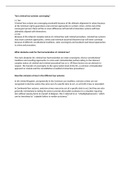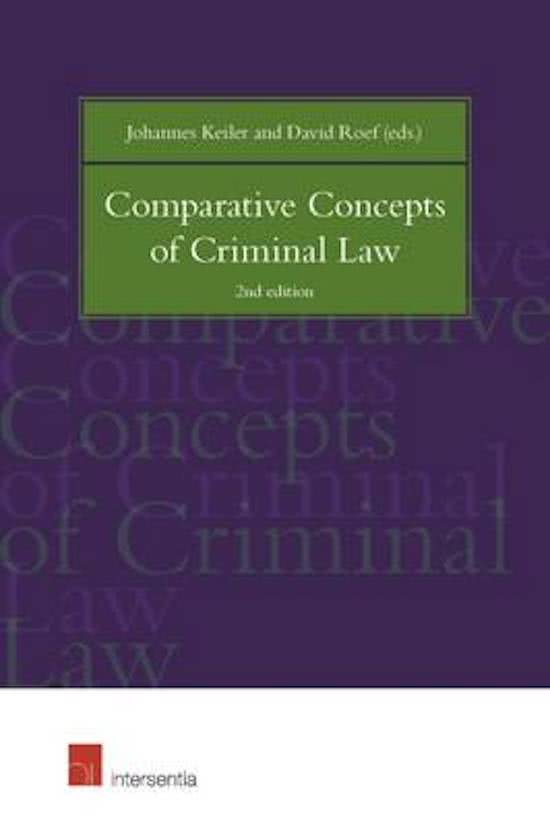²Are criminal law systems converging?
1.) Yes:
Criminal law systems are converging eventually because of the ultimate alignment in values because
of the minimum rights guarantees and common approaches to certain crimes. At the end of this
convergent process there will be no more differences left and all criminal law systems will have
ultimately aligned with themselves.
2.) No:
Because of the inherent complex nature of criminal law and criminal procedure, criminal law systems
may share common approaches, crimes and minimum doctrinal theorems but will never converge
because of different constitutional traditions, state sovereignty and localized need-based approaches
to crime and procedure.
What obstacles exist for the harmonization of criminal law?
The main obstacles for criminal law harmonization are state sovereignty, diverse constitutional
traditions and resulting approaches to crime and criminalization policies aiding to the inherent
complex nature of criminal and criminal procedural law as is. All these factors are an obstacle to
respect. The transfer of sovereignty to the supra-nation level of the EU, a common criminalization
approach or statute and the consolidation of unified criminal law (procedure).
Describe omission crimes in the different law systems:
In the United Kingdom, and generally in the Common Law tradition, omission crimes are not
recognized in doctrine unless they arise out of a specific duty to act, as set forth in law or precedent.
In Continental law systems, omission crimes may arise out of a specific duty to act, but they are also
generally criminalized as failing the duty to provide all possible assistance to a situation requiring
aid, without causing harm to oneself. In Belgium, this is referred to as "schuldighulpverzuim," which
can be translated as "culpable failure to render assistance."
,Concept of Causality. Give examples in different law systems
Causality is the notion of finding the nature of the relation between the act and its consequence.
From a comparative perspective there are three different ways of approaching this relation but
foremost all these approaches one trait in common and that is for criminal causality to be present
the first step is to ascertain if the act, be it an omission or commission, was instrumental for the
following result, i.e. would the result come to bear in the same way or not, with or without the ‘act’
in question. This is called the conditio sine qua non test.
The second step in finding the nature of causality is where there is a comparative difference present:
These second steps are to be described by the following theoremas:
1.) The Equivalence Theory
Used in Belgium this theory holds all causalities that withstand the condito test equally responsible.
E.g.: A person through a fault of another is treated in a hospitable where another fault is made with
a damaging effect (i.c. HIV-tranfusion) in the EQ-theory, the person responsible for the ‘first’ fault is
held responsible for the first AND second.
2.) The Proxima Causa Theory
Used in The United Kingdom this theory looks at which cause was the closest in a line of events to the
damaging fact.
E.g.: A drunk driver hits a car, that hits another car, but this person was also texting and driving and
without last, the resulting accident would have been avoided, but without the first collision the
second would also never have happened. The last causa, i.e. the texter and driver, will be held
responsible as he was the closest factor to the final accident.
3.) The Adequate Causa Theory
Used in France and the Netherlands this theory looks at which cause and or the cause itself tends to
be the most probable or foreseeable cause of the incident as a general tendency in human
interaction. This question introduces a normative criterium to the question of causality.
E.g.: Consider a drunk driver hitting another vehicle that is unbeknownst being used as a transport
car by a terrorist organization and has a significant amount of highly unstable TATP-explosives in the
boot of the car, resulting in a catastrophic explosion. In general, the simple crashing of a car into
another car’s boot will not set off an explosion. Ergo, the drunk driver cannot be held criminally
responsible.
For causality there is needed:
A. The conditio sine quo non est lust be fullfilled
Yes, this condition must fulfilled in all causa theorems.
B. Alle cause to be taken into account
If theory of equivalence is used, AND, all those causes withstand the condito test; yes.
C. Events that happen too far in time will not be taken into account.
If proxima causa theory is applied and generally also in the other theorem’s because the conditio test
would eventually be impossible to ascertain.
D. Previous events are excluded.
If proxima causa theory is applied, yes.
, Do you think that the concept of “fault” is a type of mens rea that is useful for criminal liability?
The concept of "fault" is a type of mens rea, or mental element, that is often detrimental to
determine criminal liability. In general, mens rea refers to the state of mind that a person must have
in order to be found guilty of a crime. The specific mental element required for a crime can vary
depending on the specific offense. It implicates a rational choice over behavior and is a remedy to
criminalization solely based on harmful outcome.
In most legal systems, the concept of fault is an important element of criminal liability. For example,
in most Common Law doctrines, a person can only be found guilty of a crime if they acted with a
certain level of fault, such as intent, reckless, or negligent conduct. In these systems, fault is often
used as a way to distinguish between different levels of wrongdoing and to assign different levels of
punishment based on the severity of the offense.
In other legal doctrines, fault is not always an explicit element of criminal liability. For example, strict
liability offenses (UK) do not require any proof of fault in order to be found guilty. In these cases, a
person can be found guilty of a crime simply by engaging in the prohibited conduct, regardless of
their state of mind.
E.g. Reckless driving; the conspiracy to murder (UK) where there is no effective fault present but the
act of committing the discussion of potentially murdering is the crime itself. This goes against the
main principle in criminal law that ‘moral thoughts’ are in itself not to be criminalized. (Die Gedanken
sind frei) ; the conviction of engaging in sexual intercourse with a minor regardless of the knowledge
of this fact (DE & NL) In Belgium this is similar but the knowledge of the age is presumed unless a
special defense (E.g. convincing deception) can be made.
There is ongoing debate about the usefulness of the concept of fault in determining criminal liability.
Some argue that fault is an important element of criminal law because it allows for the punishment
of those who knowingly and willingly engage in wrongful conduct. Others argue that fault is not
always a reliable indicator of criminal responsibility and that other factors, such as the harm caused
by the offense, should be considered when determining guilt.
In my opinion, the concept of fault is a useful tool for determining criminal liability in certain
situations. However, I also believe that it is important to consider the specific circumstances of each
case and to consider other factors, such as the harm caused by the offense, when determining the
appropriate level of punishment. The dichotomy between fault and fault through high risk behaviors
is to me of an doctrinal value but no practical value as the inherent acceptance of engagement in
high risk behavior is a breach of social contract and thus a fault in itself.





